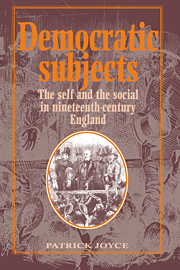Book contents
- Frontmatter
- Contents
- List of plates
- Acknowledgements
- Introduction
- Part One The sorrows of Edwin Waugh: a study in ‘working-class’ identity
- Part Two John Bright and the English people: a study in ‘middle-class’ identity
- Part Three Democratic romances: narrative as collective identity in nineteenth-century England
- Appendices
- Index
Introduction
Published online by Cambridge University Press: 10 December 2009
- Frontmatter
- Contents
- List of plates
- Acknowledgements
- Introduction
- Part One The sorrows of Edwin Waugh: a study in ‘working-class’ identity
- Part Two John Bright and the English people: a study in ‘middle-class’ identity
- Part Three Democratic romances: narrative as collective identity in nineteenth-century England
- Appendices
- Index
Summary
This history is the story of two men, and of the stories they and others told in order that it might be known who they were. It is a history of identity, about ‘the self’ and about ‘the social’, the latter in the sense of collective identities, and the contexts in which these were set. The quotation marks signal that these terms have significance in so far as their meanings are made by us, and not found by us in a world beyond this assignation of meaning. In thinking about identities in the past, whether of the ‘self’ or of the collective, class has, until recently, occupied a very considerable role among social historians, especially those of the nineteenth century. The sorrows of Edwin Waugh, and the measured certainties of John Bright, serve to question this dominance, as do the democratic romances that gave shape to the social and political imagination of millions of their contemporaries. Other forms of the self and of collective identity emerge, long obscured by the concentration on class. And class itself, like any other collective ‘social’ subject, is seen to be an imagined form, not something given in a ‘real’ world beyond this form.
All three accounts involve looking at subjectivities, at the subject as a self and as an imagined collectivity.
- Type
- Chapter
- Information
- Democratic SubjectsThe Self and the Social in Nineteenth-Century England, pp. 1 - 20Publisher: Cambridge University PressPrint publication year: 1994



